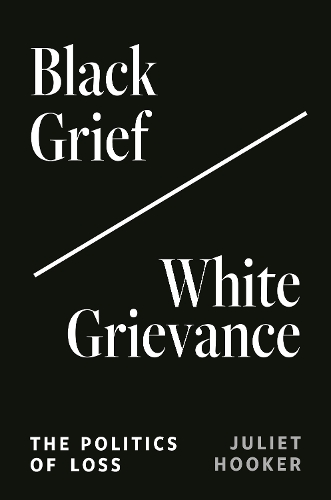
Black Grief/White Grievance: The Politics of Loss
(Paperback)
Available Formats
Publishing Details
Black Grief/White Grievance: The Politics of Loss
By (Author) Juliet Hooker
Princeton University Press
Princeton University Press
14th May 2025
United States
Classifications
Tertiary Education
Non Fiction
Politics and government
Society and Social Sciences
Racism and racial discrimination / Anti-racism
323.1196073
Physical Properties
Paperback
360
Width 140mm, Height 216mm
Description
Howrace shapes expectations about whose losses matter
In democracies, citizens must accept loss; we can't always be on the winning side. But in the United States, the fundamental civic capacity of being able to lose is not distributed equally. Propped up by white supremacy, whites (as a group) are accustomed to winning; they have generally been able to exercise political rule without having to accept sharing it. Black citizens, on the other hand, are expected to be political heroes whose civic suffering enables progress toward racial justice. In this book, Juliet Hooker, a leading thinker on democracy and race, argues that the two most important forces driving racial politics in the United States today are Black grief and white grievance. Black grief is exemplified by current protests against police violence-the latest in a tradition of violent death and subsequent public mourning spurring Black political mobilization. The potent politics of white grievance, meanwhile, which is also not new, imagines the United States as a white country under siege.
Drawing on African American political thought, Hooker examines key moments in US racial politics that illuminate the problem of loss in democracy. She connects today's Black Lives Matter protests to the use of lynching photographs to arouse public outrage over postReconstruction era racial terror, and she discusses Emmett Till's funeral as a catalyst for the civil rights struggles of the 1950s and 1960s. She also traces the political weaponization of white victimhood during the Obama and Trump presidencies. Calling for an expansion of Black and white political imaginations, Hooker argues that both must learn to sit with loss, for different reasons and to different ends.
Reviews
"A Seminary Co-Op Notable Book of the Year"
"Finalist for the PROSE Award in Government and Politics, Association of American Publishers"
"This fascinating and critical research sheds light on the personal and political ramifications of loss and the racial inequities they continue to perpetuate."---Karla J. Strand, Ms. Magazine
"[A] powerful book . . . [Hooker] brilliantly seams together examples from 19th century journalism and literature, well-known civil rights battles of the mid-20th century, and the recent Black Lives Matter movement, among other topics, to illustrate how Black folks consistently turn grief inflicted by recurrent lethal violence into grievance, demanding justice and a stronger multiracial democracy." * Choice *
"Insightful, urgent, and beautifully written."---Katherine A. Gordy, Theory & Event
"An intriguing, academic analysis of the link between U.S. racial politics and democracy."---Rebekah Kati, Library Journal
Author Bio
Juliet Hooker is the Royce Family Professor of Teaching Excellence in Political Science at Brown University. She is the author of Race and the Politics of Solidarity and TheorizingRace in the Americas:Douglass, Sarmiento, Du Bois, and Vasconcelos, which was awarded the American Political Science Association's 2018 Ralph Bunche Book Award for the best work in ethnic and cultural pluralism and the 2018 Best Book Award of the Race, Ethnicity, and Politics Section of the American Political Science Association.
